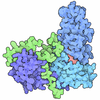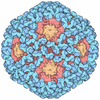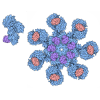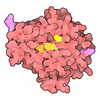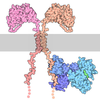Entry Database : PDB / ID : 3zy1Title Crystal structure of the human p63 tetramerization domain TUMOR PROTEIN 63 Keywords / / / Function / homology Function Domain/homology Component
/ / / / / / / / / / / / / / / / / / / / / / / / / / / / / / / / / / / / / / / / / / / / / / / / / / / / / / / / / / / / / / / / / / / / / / / / / / / / / / / / / / / / / / / / / / / / / / / / / / / / / / / / / / / / / / / / / Biological species HOMO SAPIENS (human)Method / / / Resolution : 2.15 Å Authors Natan, E. / Joerger, A.C. Journal : J.Mol.Biol. / Year : 2012Title : Structure and Kinetic Stability of the P63 Tetramerization Domain.Authors : Natan, E. / Joerger, A.C. History Deposition Aug 16, 2011 Deposition site / Processing site Revision 1.0 Nov 30, 2011 Provider / Type Revision 1.1 Jan 25, 2012 Group Revision 1.2 May 8, 2019 Group / Experimental preparation / OtherCategory database_PDB_rev / database_PDB_rev_record ... database_PDB_rev / database_PDB_rev_record / exptl_crystal_grow / pdbx_database_proc / pdbx_database_status Item / _exptl_crystal_grow.temp / _pdbx_database_status.recvd_author_approvalRevision 1.3 May 8, 2024 Group / Database references / Category / chem_comp_bond / database_2Item / _database_2.pdbx_database_accession
Show all Show less
 Open data
Open data Basic information
Basic information Components
Components Neoplasm
Neoplasm  Keywords
Keywords TRANSCRIPTION /
TRANSCRIPTION /  TRANSCRIPTION FACTOR / TETRAMERIZATION DOMAIN / CELL-CYCLE CONTROL
TRANSCRIPTION FACTOR / TETRAMERIZATION DOMAIN / CELL-CYCLE CONTROL Function and homology information
Function and homology information WW domain binding / skin morphogenesis / cranial skeletal system development /
WW domain binding / skin morphogenesis / cranial skeletal system development /  sympathetic nervous system development / post-anal tail morphogenesis / embryonic forelimb morphogenesis / embryonic hindlimb morphogenesis / TP53 Regulates Transcription of Death Receptors and Ligands / Activation of PUMA and translocation to mitochondria / Regulation of TP53 Activity through Association with Co-factors / hair follicle morphogenesis / positive regulation of Notch signaling pathway / regulation of epidermal cell division / TP53 regulates transcription of several additional cell death genes whose specific roles in p53-dependent apoptosis remain uncertain / positive regulation of stem cell proliferation / TP53 Regulates Transcription of Caspase Activators and Caspases / epithelial cell development / odontogenesis of dentin-containing tooth / negative regulation of cellular senescence / TP53 Regulates Transcription of Genes Involved in Cytochrome C Release / keratinocyte proliferation / intrinsic apoptotic signaling pathway in response to DNA damage by p53 class mediator / establishment of skin barrier /
sympathetic nervous system development / post-anal tail morphogenesis / embryonic forelimb morphogenesis / embryonic hindlimb morphogenesis / TP53 Regulates Transcription of Death Receptors and Ligands / Activation of PUMA and translocation to mitochondria / Regulation of TP53 Activity through Association with Co-factors / hair follicle morphogenesis / positive regulation of Notch signaling pathway / regulation of epidermal cell division / TP53 regulates transcription of several additional cell death genes whose specific roles in p53-dependent apoptosis remain uncertain / positive regulation of stem cell proliferation / TP53 Regulates Transcription of Caspase Activators and Caspases / epithelial cell development / odontogenesis of dentin-containing tooth / negative regulation of cellular senescence / TP53 Regulates Transcription of Genes Involved in Cytochrome C Release / keratinocyte proliferation / intrinsic apoptotic signaling pathway in response to DNA damage by p53 class mediator / establishment of skin barrier /  Pyroptosis / positive regulation of osteoblast differentiation / keratinocyte differentiation / MDM2/MDM4 family protein binding /
Pyroptosis / positive regulation of osteoblast differentiation / keratinocyte differentiation / MDM2/MDM4 family protein binding /  Notch signaling pathway /
Notch signaling pathway /  skeletal system development / stem cell proliferation / positive regulation of apoptotic signaling pathway / determination of adult lifespan / promoter-specific chromatin binding / TP53 Regulates Metabolic Genes / protein tetramerization / RNA polymerase II transcription regulatory region sequence-specific DNA binding /
skeletal system development / stem cell proliferation / positive regulation of apoptotic signaling pathway / determination of adult lifespan / promoter-specific chromatin binding / TP53 Regulates Metabolic Genes / protein tetramerization / RNA polymerase II transcription regulatory region sequence-specific DNA binding /  cellular senescence /
cellular senescence /  p53 binding /
p53 binding /  spermatogenesis / DNA-binding transcription activator activity, RNA polymerase II-specific / neuron apoptotic process / transcription by RNA polymerase II / damaged DNA binding / DNA-binding transcription factor activity, RNA polymerase II-specific /
spermatogenesis / DNA-binding transcription activator activity, RNA polymerase II-specific / neuron apoptotic process / transcription by RNA polymerase II / damaged DNA binding / DNA-binding transcription factor activity, RNA polymerase II-specific /  chromatin remodeling / RNA polymerase II cis-regulatory region sequence-specific DNA binding / DNA-binding transcription factor activity / negative regulation of DNA-templated transcription / apoptotic process / DNA damage response /
chromatin remodeling / RNA polymerase II cis-regulatory region sequence-specific DNA binding / DNA-binding transcription factor activity / negative regulation of DNA-templated transcription / apoptotic process / DNA damage response /  dendrite /
dendrite /  chromatin binding /
chromatin binding /  chromatin / regulation of transcription by RNA polymerase II / positive regulation of DNA-templated transcription / negative regulation of transcription by RNA polymerase II / positive regulation of transcription by RNA polymerase II /
chromatin / regulation of transcription by RNA polymerase II / positive regulation of DNA-templated transcription / negative regulation of transcription by RNA polymerase II / positive regulation of transcription by RNA polymerase II /  DNA binding /
DNA binding /  nucleoplasm / identical protein binding /
nucleoplasm / identical protein binding /  metal ion binding /
metal ion binding /  nucleus /
nucleus /  cytoplasm
cytoplasm
 HOMO SAPIENS (human)
HOMO SAPIENS (human) X-RAY DIFFRACTION /
X-RAY DIFFRACTION /  SYNCHROTRON /
SYNCHROTRON /  MAD / Resolution: 2.15 Å
MAD / Resolution: 2.15 Å  Authors
Authors Citation
Citation Journal: J.Mol.Biol. / Year: 2012
Journal: J.Mol.Biol. / Year: 2012 Structure visualization
Structure visualization Molmil
Molmil Jmol/JSmol
Jmol/JSmol Downloads & links
Downloads & links Download
Download 3zy1.cif.gz
3zy1.cif.gz PDBx/mmCIF format
PDBx/mmCIF format pdb3zy1.ent.gz
pdb3zy1.ent.gz PDB format
PDB format 3zy1.json.gz
3zy1.json.gz PDBx/mmJSON format
PDBx/mmJSON format Other downloads
Other downloads https://data.pdbj.org/pub/pdb/validation_reports/zy/3zy1
https://data.pdbj.org/pub/pdb/validation_reports/zy/3zy1 ftp://data.pdbj.org/pub/pdb/validation_reports/zy/3zy1
ftp://data.pdbj.org/pub/pdb/validation_reports/zy/3zy1 Links
Links Assembly
Assembly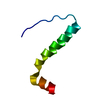
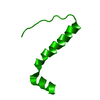
 Components
Components Neoplasm / P63 / CHRONIC ULCERATIVE STOMATITIS PROTEIN / CUSP / KERATINOCYTE TRANSCRIPTION FACTOR KET / ...P63 / CHRONIC ULCERATIVE STOMATITIS PROTEIN / CUSP / KERATINOCYTE TRANSCRIPTION FACTOR KET / TRANSFORMATION-RELATED PROTEIN 63 / TP63 / TUMOR PROTEIN P73-LIKE / P73L / P40 / P51
Neoplasm / P63 / CHRONIC ULCERATIVE STOMATITIS PROTEIN / CUSP / KERATINOCYTE TRANSCRIPTION FACTOR KET / ...P63 / CHRONIC ULCERATIVE STOMATITIS PROTEIN / CUSP / KERATINOCYTE TRANSCRIPTION FACTOR KET / TRANSFORMATION-RELATED PROTEIN 63 / TP63 / TUMOR PROTEIN P73-LIKE / P73L / P40 / P51
 HOMO SAPIENS (human) / Production host:
HOMO SAPIENS (human) / Production host: 
 ESCHERICHIA COLI (E. coli) / References: UniProt: Q9H3D4
ESCHERICHIA COLI (E. coli) / References: UniProt: Q9H3D4 X-RAY DIFFRACTION
X-RAY DIFFRACTION Sample preparation
Sample preparation
 SYNCHROTRON / Site:
SYNCHROTRON / Site:  Diamond
Diamond  / Beamline: I03 / Wavelength: 0.9791
/ Beamline: I03 / Wavelength: 0.9791  : 0.9791 Å / Relative weight: 1
: 0.9791 Å / Relative weight: 1  Processing
Processing :
:  MAD
MAD Movie
Movie Controller
Controller



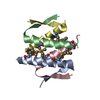




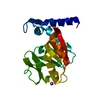
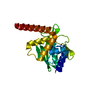
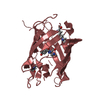
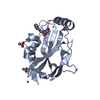
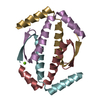
 PDBj
PDBj
